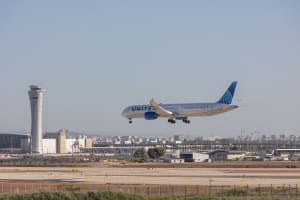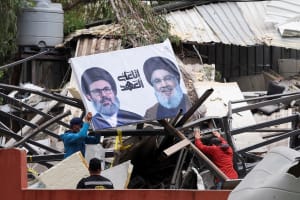Jordan cracks down on the Muslim Brotherhood – a hotbed for Islamism, terrorism & anti-Israel propaganda
Muslim Brotherhood ideology forms the basis for most of today's Sunni terrorist groups

On April 25, the Kingdom of Jordan announced a sweeping ban on the Muslim Brotherhood (MB), a wildly popular Islamist group with deep roots across the region whose affiliated party won Jordan’s parliamentary elections last year.
The ban, announced in a dramatic statement by Interior Minister Mazen Faraya, followed the discovery of several terror plots linked to members of the group.
It will now be illegal to be a member of the Brotherhood, to promote its ideology, or to publish materials on its behalf. Faraya ordered the closure of any offices or headquarters used by the Brotherhood throughout the country, even if shared with other organizations.
The MB attempted to smuggle and destroy a large quantity of documents from its headquarters to hide its suspicious activities and affiliations, Faraya said. He added that security agencies also uncovered an operation to manufacture and test explosives, led by the son of one of the group’s leaders, along with others who sought to target security agencies and sensitive sites in the Kingdom.
Despite the MB’s main organization having been disbanded in 2020, a splinter group was allowed to continue operating.
The Muslim Brotherhood's affiliated Islamic Action Front Party even emerged as the largest party in the nation last September, winning 31 of the 138 seats in the parliament and demonstrating the enormous popularity of the group's ideology.
History and Ideology
The Muslim Brotherhood is one of the most powerful forces breeding and propagating radical Islamism across the Muslim World, and is banned in most – and even designated a terror group in some – of the nations in the region.
The “Society of the Muslim Brothers,” as it is officially called in Arabic, was founded by school teacher Hassan al-Banna in Egypt in 1928, during a moment of deep crisis across the Muslim world.
Amid European dominance over much of Islam’s heartlands in the Middle East and the abolition of the caliphate in 1924, the MB offered a simple, powerful remedy to the problems plaguing the Muslim world: “Islam is the solution.”
Using this and similar slogans, al-Banna quickly gathered followers with a mix of firebrand preaching and charitable works, building an organized group that included an early, secretive military arm that took part in the attack on Israel during its War of Independence in 1948.
From the start, the MB also propagated antisemitic and anti-Zionist propaganda, and praised the Nazis, before al-Banna disavowed fascism after the war.
After Gamal Abdel Nasser came to power in Egypt, he led a period of brutal suppression and persecution of the MB. During the 1950s and 1960s, many brothers fled the country and established branches across the region.
During this time of suppression, some members of the MB, including the infamous Sayyid Qutb, theorized a doctrine of offensive jihad against the “unbelievers” through revolutionary struggle and terrorism, which eventually became the ideological basis of most modern Sunni terror groups, including ISIS and al-Qaeda.
Today, the MB is outlawed by most countries in the region, especially after its successful activities in the fields of education, charity, and religion enabled it to attempt to use the Arab Spring to vie for political power in several countries.
The MB was most successful in its home country of Egypt. However, shortly after MB leader Mohammed Morsi was chosen as president in a democratic election, army chief Abdel Fattah el-Sisi took power in a coup, once again condemning the Muslim Brotherhood to the shadows.
Notable exceptions to the regional crackdown on the Muslim Brotherhood include Turkey, where the ruling AK Party espouses a related but less extreme Islamist ideology, and Qatar.
The Gulf Emirate not only tolerates the Brotherhood but has actively supported it by providing refuge to prominent leaders and funding its dissemination of propaganda through the state news channel, Al Jazeera.
The most prominent MB figure on the channel was the Egyptian scholar Yusuf al-Qaradawi, who died in 2022. He enjoyed enormous popularity through his “Sharia and Life” television program, which reached an estimated 40 to 60 million viewers worldwide over two decades.
Qaradawi was among the most well-known voices condoning and praising suicide attacks on Israeli civilians, arguing that the entire population – including women and babies – was eligible to serve in the military, making them legitimate targets.
He also visited the Hamas terrorist organization in Gaza in 2013, being greeted as “the Sheikh of the Arab Spring, the Sheikh of the revolution and the Sheikh of Jihad in Palestine,” by former Hamas leader Ismail Haniyeh.
Muslim Brotherhood and Israel
Hamas took Qaradawi’s fatwas (legal rulings) as a source of supreme religious authority, reflecting its own roots in the Muslim Brotherhood.
Israel’s capture of the Gaza Strip from Egypt in 1967 ended the local MB's period of persecution and allowed it to expand.
Israel initially allowed the brothers to build mosques, social clubs, schools, and other institutions, viewing it as a counterweight to the secular terrorists of the Palestine Liberation Organization (PLO).
However, the group’s local leader – Sheikh Ahmad Yassin, a nearly blind, wheelchair-bound scholar – led the Gazan Muslim Brotherhood down a more violent path, adopting a nationalist, revolutionary, and terrorist ideology under a new moniker: HAMAS, short for “Islamic Resistance Movement.”
The Muslim Brotherhood also established branches in Israel, most notably the “Islamic Movement in Israel.” Its founder, Abdullah Nimr Darwish, shifted toward peaceful and charitable activities after serving time in an Israeli prison, prompting a split within the movement.
The northern branch of MB continued on a radical course and was outlawed in 2015 due to its ties to Hamas and the broader Muslim Brotherhood movement. The southern branch, however, decided to follow the political route. Starting from the 90s, its political wing, the Ra’am Party, ran in several elections together with the other Arab parties.
This led to an extraordinary situation: representatives of an organization directly tied to Muslim Brotherhood ideology are now sitting in the Israeli Knesset.
In the 2021 Israeli elections, party leader Mansour Abbas decided the Ra’am party would run on its own. The party won four seats and eventually joined the Israeli government, the first Arab party to do so.
Today, Ra’am seeks a different path than its “brothers,” preferring the political process over violence, while still advocating for Islamic religious values.
The Arab Ra'am party supports a two-state solution, which is considered a moderate position among Palestinians since this recognizes Israel’s right to exist. Abbas has even stated that he accepts Israel’s existence as a de facto Jewish state, another unprecedented statement.
However, despite other positive signs, such as condemnations of terror attacks in Hebrew, there are still concerns.
The party, and its parent organization, the Islamic Movement, continue to demonstrate support for “security prisoners,” most of them convicted terrorists, praising them as freedom fighters and providing them aid through charity organizations.
The Muslim Brotherhood has shaped an era of Islamism and terror in the Middle East. While its ban in Jordan has deprived it of one of its last strongholds, its influence will likely continue to linger across the region for some time to come.

Hanan Lischinsky has a Master’s degree in Middle East & Israel studies from Heidelberg University in Germany, where he spent part of his childhood and youth. He finished High School in Jerusalem and served in the IDF’s Intelligence Corps. Hanan and his wife live near Jerusalem, and he joined ALL ISRAEL NEWS in August 2023.
You might also like to read this:

















